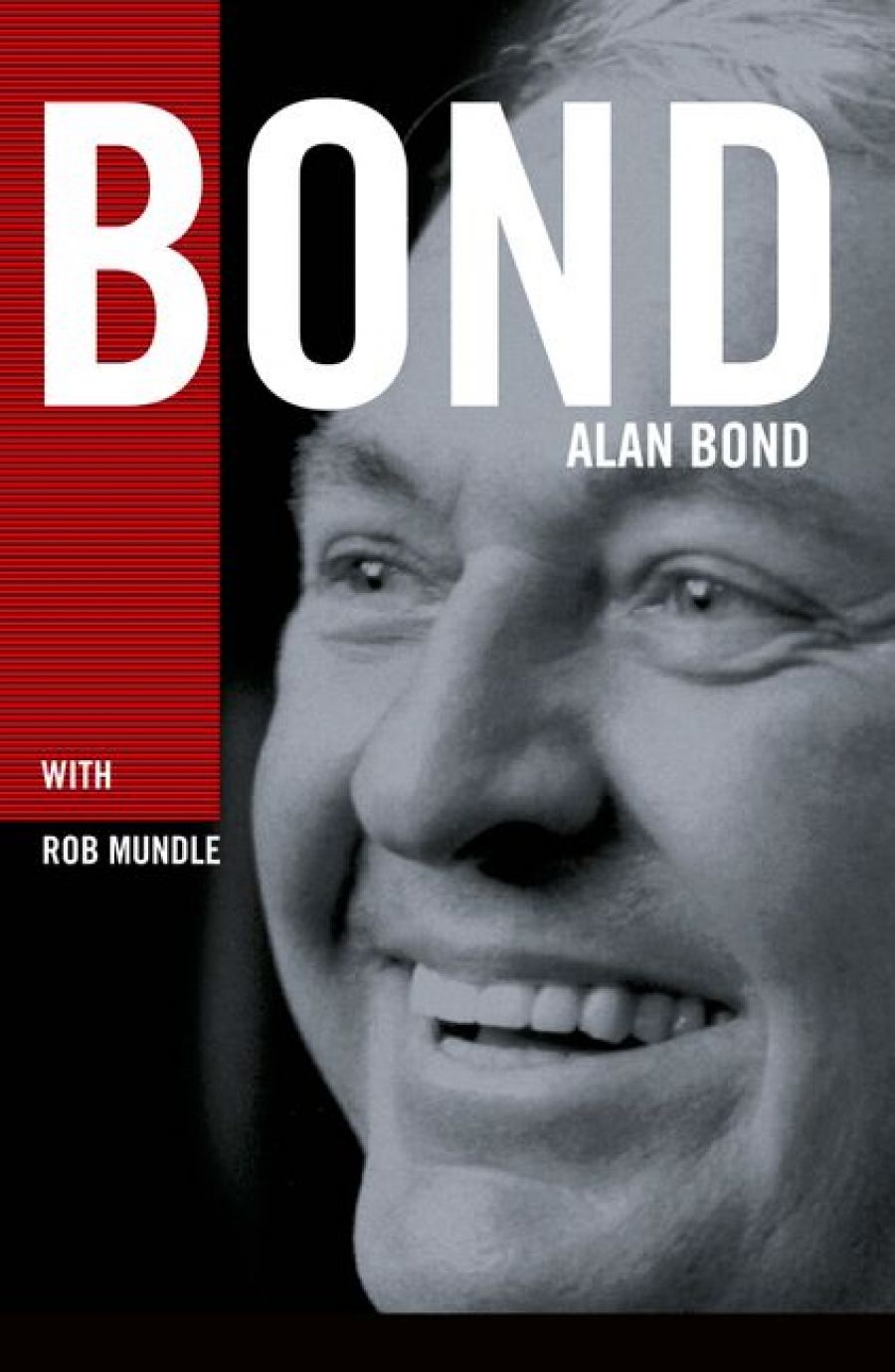
- Free Article: No
- Review Article: Yes
- Online Only: No
- Custom Highlight Text:
For a man who was supposed to have a shot memory, Alan Bond has a remarkable power of recall. In the mid1990s, facing fraud charges concerning his dealings in Manet’s painting La Promenade, he – or rather, his barristers – successfully argued in court that a series of minor strokes had left him with brain damage and a memory so defective he couldn’t possibly be expected to answer prosecution questions. Those Australians who reckoned all along that he faked the forgetfulness, the shuffling gait, and the vacant stare at the television cameras outside court will doubtless be confirmed in their view that he’s a shameless liar.
- Book 1 Title: Bond
- Book 1 Biblio: HarperCollins, $45 hb, 336 pp
- Book 1 Cover Small (400 x 600):

- Book 1 Cover (800 x 1200):

For example, there’s the time in the early 1970s when he spray-painted sand dunes green to make a property development north of Perth seem lush with promise to investors. ‘I needed to stabilise the sand as well as make the property look more appealing. The solution soon became obvious – just mix green paint and grass seeds with a light bitumen and spray all the sand hills with it, and voilà, you’ve solved both problems in one hit.’
There’s a lot of voilà in this book. The 1980s was a voilà period in big business. Bond was buying company after company on tick, sometimes without even checking with bankers first if they’d lend him the money. Page after page is filled with recollections of conversations that go like this: ‘I pulled out my chequebook and said: “I’ll give you $500 million. Here’s my cheque for 10 per cent deposit now.” ... I rang Willie Purves, the chairman of the Hong Kong and Shanghai Banking Corporation and said, “Look, I’ve just given a cheque for $50 million, and we’re going to pay the balance of $450m in 30 days.”’ No problems. The cheque was cleared. Voilà. He recalls telling Channel Nine owner Kerry Packer that he’d raised the $1 billion needed to buy the network in 1987. “It looks like I’ve got the cash. It’s a deal,” I said to Kerry as I hung up (he’d been on the phone to his bevy of bankers).’ Voilà.
Former Wall Street trader, Michael Lewis, one of America’s savviest business commentators, wrote in The Future Just Happened (2001): ‘All through the 1980s the prototypical hotshot sat hunched down beneath his desk with phone pressed to his ear trying to talk some poor schmuck into wiring a billion dollars from one end of the planet to the other so that he could take a little slice of it.’ That description shouldn’t be confined to commerce in the 1980s. It’s happening every day. But as descriptions go, it fits Bond neatly, and the financial smoke-and-mirror land he inhabited.
Bond’s book is a work of personal history that has, in no small degree, merit, intentional, or otherwise, as a slice of social history – Australian corporate culture at the end of the twentieth century. And, of course, there are plenty of America’s Cup reminiscences to keep yachties and jingoists alike swooning.
This is not a book for the morally faint-hearted. Bond’s pen is not dipped in the purifying waters of penance. If you recall, he was convicted of frauds totalling more than $1 billion. He was sentenced to three years’ jail in 1996 for the La Promenade fraud, concerning lease arrangements for the painting between his private company Dallhold and the listed Bond Corporation. In 1997 he was sentenced to four years’ jail for deceiving shareholders and siphoning more than $1 billion from cash-rich Bell Resources to its cash-poor parent, Bond Corporation. (He was released from jail in 2000.)
In 1992 he was declared bankrupt. He was eventually discharged after settling with creditors for some $10 million, a fraction of his actual debts, amid speculation that he had shuffled his affairs in such a way – trust accounts, a network of overseas companies, through all manner of legal loopholes exploited by well-paid lawyers and financial advisers – that he was bankrupt only in name, not in reality. Not so, he claims in his book.
In fact, he denies wrongdoing of any kind, apart from some minor lapses in due diligence here and there. He mounts his defence in these pages, creating a paper kangaroo court that naturally finds in his favour. His fraud convictions were just bum raps in his opinion. The system was against him – out to get him. ‘I have no doubt the federal government wanted to look inside Bond Corporation because we were seen to be too powerful ... we could influence the outcome of elections.’
In The Future Just Happened, Lewis observes: ‘To understand his role in the world the capitalist often had his Grand Narrative ... an almost obsessive need to tell himself a story to justify what he was doing with other people’s money.’ Such people, who have fallen from grace, inevitably divide their narratives into two parts: their monumental vision for making the world a fantastic place; and their tale of persecution for their extraordinary vision. In Bond, these two strands are displayed thus: ‘I have proved over and over again that what many people see as impossible can actually be achieved. It’s that belief, as I have said, that led to a lot of people trying to bring me down or hinder my progress because they couldn’t grasp my vision.’
Ah, they never do.


Comments powered by CComment